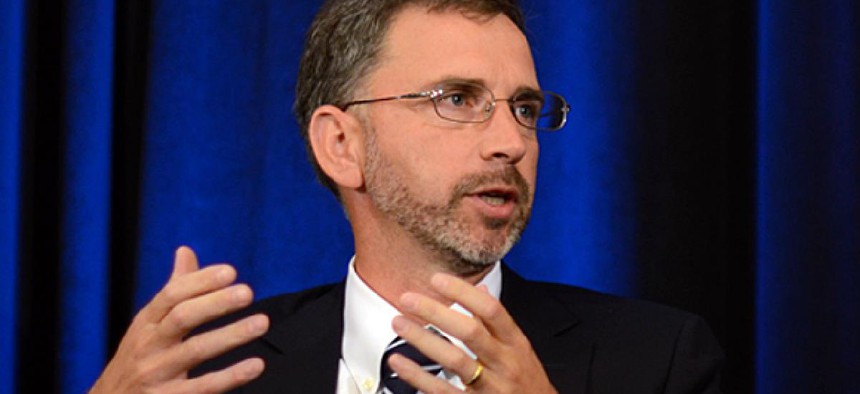
GSA 's Dan Tangherlini suggested a big future for “crowd sourcing.” Caitlin Fairchild/GovExec.com
Hunting for 'Great Ideas' Should Be an Everyday Affair, GSA Chief Says
Employee suggestions have saved $6 million so far.
The Great Ideas Hunt among General Services Administration employees last year should become an everyday practice at all agencies, acting Administrator Dan Tangherlini said Tuesday.
The in-house dialog on innovation, which produced 632 promising ideas for new efficiencies and has so far saved $6 million, “tapped into a well of frustration at GSA, where dedicated civil servants were watching the reputation of their agency go up in smoke,” Tangherlini told the national convention of the Federal Managers Association.
The online solicitation unfolded during revelations about the scandal surrounding overspending at a 2010 Las Vegas training conference.
The ideas employees submitted, which attracted 20,000 votes and comments from colleagues nationwide, “wouldn’t have come through the hierarchy on the organization chart,” Tangherlini said, suggesting a big future for “crowd sourcing.” Proposals ranged from reducing publication subscriptions to eliminating redundant surveys.
Despite staff reluctance to accuse colleagues of being wasteful, Tangherlini said, participants and commenters were required to identify themselves and expect no monetary reward. “We wanted to create an environment in which people were not saving ideas for a future cash transfer,” he said. “Every day should be a Great Ideas Hunt, and there should one in every agency.”
The hunt was conducted using an online collaborative tool called “SalesForce,” and the initial response was “overwhelming,” Tangherlini said. To evaluate and pose further questions, his team had to manage a triage process and pull in a “surge force” from offices around GSA such as the policy team and Federal Employee Viewpoint Survey specialists.
“The first way to stop an idea is to ask how we would pay for it, and who’s going to do the work, so it never happens,” Tangherlini said. “We decided to worry about that later.”
The acting administrator personally read many of the suggestions and made comments, which, despite being extra work, “was a great way to end the day,” he said. He also praised the interagency dialogue the Great Hunt spawned.
Reacting to the recent decision by the Yahoo company to discourage telecommuting, Tangherlini stressed that there is “no one model or silver bullet” on the practice. But GSA is pressing ahead, he said, with its embrace of telecommuting, use of social media and open-space office layout that takes advantage of the fact that government desks sit empty for much of the day.
“My desk is a place I occasionally see,” Tangherlini said. “I walk by it and go to meetings. Why condemn the taxpayers to fixed costs so that I can have a giant desk with two flags behind it? If we can we break ourselves of these expectations” and take down the walls between offices, the productivity will go up, he said.
Asked about coming improvements to the governmentwide website portal USA.gov, the GSA chief said his team is working on a common search architecture that would be free to all agencies. “People don’t go to websites but to search engines,” he said. There is some resistance from people who say, “My agency is unique, special and bespoke,” Tangherlini said. “That is a manifestation of the organization chart and protecting turf.”







